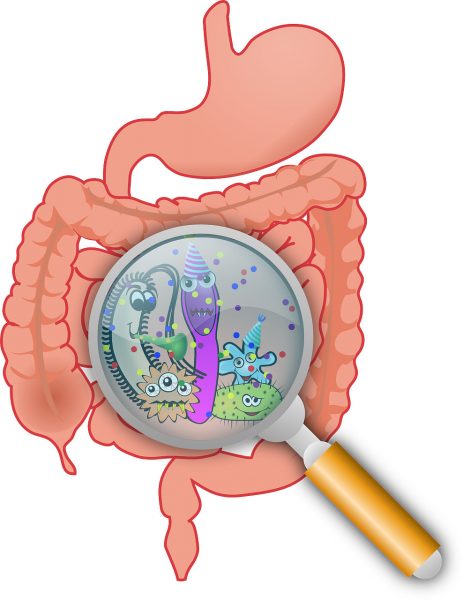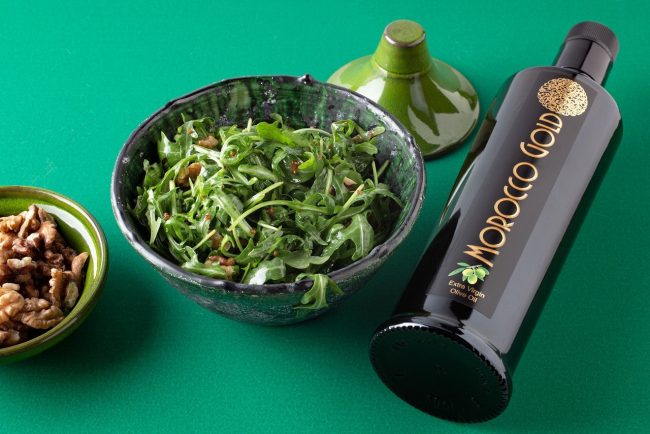New Evidence Shows Crucial Link Between Healthy Diet and Microbiome
Updated October 30th 2023

Are you on the lookout for delicious, healthy meal options that could improve your gut microbiome? Look no further than extra virgin olive oil!
Contents:
- Healthy Eating With Extra Virgin Olive Oil To Boost Your Gut Microbiome
- What Is The Gut Microbiome And How Can Extra Virgin Olive Oil Help?
- How Does Extra Virgin Olive Oil Help The Digestive System
- Extra Virgin Olive Oil & The Stomach
- Extra Virgin Olive Oil & The Hepatic-biliary System
- Extra Virgin Olive Oil & The Pancreas
- Extra Virgin Olive Oil & The Intestines
- Recipes With Extra Virgin Olive Oil For A Healthy Gut
Adding flavorful and health boosting extra virgin olive oil to your diet can not only improve the taste of your meals but also support a healthier gut microbiome? Increasing evidence suggests that regularly eating foods containing added extra virgin olive oil helps to maintain and even improve the diversity of bacteria in our guts.
From improved digestion to increased nutrient absorption, discover all of the ways that incorporating a diet including Extra Virgin Olive Oil can benefit your health!
Did you know that the gut microbiome – trillions of bacteria that live in your digestive system – is strongly linked to your overall health? And a healthy diet, such as The Mediterranean Diet, is one of the best ways to support a healthy gut microbiome.
Healthy Eating With Extra Virgin Olive Oil To Boost Your Gut Microbiome
Recent evidence has come to light to support the claim that all diet-related chronic diseases are linked to the microbiome.*1
In today’s blog, we’re going to take a closer look at how diet impacts the gut microbiome, and we’ll discuss some tips for creating a Gut-Healthy Diet.
According to a new review, published in Cell Host & Microbe, presents evidence that shows a link between host gut microbiome, diet, and physiological mechanisms.
Researchers for the study – entitled ‘Rethinking healthy eating in light of the gut microbiome’ said: “It is crucial to identify health-promoting or detrimental foods and dietary patterns and translate the evidence into dietary guidelines.”
“Mechanisms by which the microbiome influences pathophysiology have been identified. These discoveries provide a strong scientific rationale to incorporate the gut microbiome in nutrition research and dietary guidelines.”

What Is The Gut Microbiome And How Can Extra Virgin Olive Oil Help?
The Gut Microbiome consists of trillions of microorganisms and their genetic material which lives in your intestinal tract. The role that these microorganisms play is critical to your health and wellbeing. As explained by foodandmoodcentre.com, these bacteria live in your digestive system and they play a key role in digesting food you eat, and they help with absorbing and synthesising nutrients too. Gut bugs are involved in many other important processes that extend beyond your gut, including your metabolism, body weight, and immune regulation, as well as your brain functions and mood.
Scientists are still trying to fully understand this community of bacteria, viruses, and fungi, but one thing is clear: what we eat affects our gut health. Studies have shown that following a Mediterranean Diet can benefit the gut microbiome, and extra virgin olive oil may be a key player in promoting a healthy gastrointestinal environment.
Not only is it rich in anti-inflammatory compounds, but it also contains nutrients that nourish the friendly bacteria living in our intestines. So, next time you cook up a delicious Mediterranean-inspired meal, remember that you’re not just filling your belly – you’re also supporting your gut health!
How Does Extra Virgin Olive Oil Help The Digestive System
We all have likely heard that extra virgin olive oil is one of the healthiest oil choices for cooking and eating. Extra virgin olive oil is high in fat, but the majority of it is heart-healthy monounsaturated fat, according to the American Heart Association. Choosing extra virgin olive oil over less healthy fats, such as butter, may benefit your heart and lower your cholesterol level. As if these benefits were not enough, extra virgin olive oil may also contribute to healthy digestion.
As soon as we consume extra virgin olive oil like Morocco Gold it has a number of effects all the way along the digestive system. As far back as in ancient times it was recommended for assorted digestive disorders, and its beneficial properties are now being corroborated by epidemiological studies and a wealth of scientific data.
Once you swallow your food, your body takes over by secreting acids and other compounds that help break down the food and transports the nutrients it contains throughout your body. According to M. Carmen Ramirez-Tortosa and Parveen Yaqoob, authors of “Olive Oil and Health,” extra virgin olive oil encourages the production of peptides, which support healthy digestion and aid in nutrient absorption. Regular consumption of extra virgin olive oil will keep your gut working efficiently by taking what it needs for good health and eliminating the rest in your waste.
Extra Virgin Olive Oil & The Stomach
Eating quickly, as well as eating high-fat foods, can cause gastric reflux, or heartburn. Heartburn is characterized by a burning sensation in your stomach, throat or esophagus due to a high concentration of acid from your body attempting to digest these unhealthy types of food. A study published in the 2004 issue of “Gracas y Aceites,” a journal that focuses on the roles of fat and oils in the human diet, notes in that extra virgin olive oil may reduce the secretion of gastric acid.
Extra virgin olive oil reduces the risk of acid reflex and prevents gastric juices from traveling back up from the stomach to the esophagus. Extra virgin olive oil inhibits gastric acid’s motility. Because of this, the stomach’s gastric content releases more gradually and slowly into the duodenum, making one feel more full, having a better digestion, and benefiting full nutrient absorption in the intestine.
Extra Virgin Olive Oil & The Hepatic-biliary System
One of the effects of extra virgin olive oil on the hepato-biliary system is that it is a cholagogue, ensuring optimal bile drainage and full emptying of the gall bladder. Another effect is that it is cholecystokinetic, i.e. it stimulates the contraction of the gall bladder, which is extremely helpful in the treatment and prevention of disorders of the bile ducts. It stimulates the synthesis of bile salts in the liver and it increases the amount of cholesterol excreted by the liver.
In short, owing to its beneficial effect on the muscle tone and activity of the gall bladder, extra virgin olive oil stimulates the digestion of lipids, because they are emulsified by the bile, and it prevents the onset of gallstones.
Extra Virgin Olive Oil & The Pancreas
Your pancreas is often an overlooked part of the digestive system, but it is essential for hormone production and for producing enzymes the small intestine needs to digest your food. Extra virgin olive oil is particularly beneficial to your pancreas because it only requires your pancreas to produce a small amount of digestive enzymes, which means that it is working less, reports the before mentioned study in “Gracas y Aceites.” This benefits your pancreas by keeping it strong and healthy. The June 2000 issue of the “Journal of Epidemiology and Community Health” adds that extra virgin olive oil may also offer protection from pancreatic cancer.
When extra virgin olive oil is consumed, the pancreas releases a small amount of secretion, helping the organ efficiently and effectively carry out its purpose within the digestive system. Researchers recommend extra virgin olive oil to patients who have pancreatic problems, including cystic fibrosis, chronic pancreatitis, pancreatic failure and malabsorption syndromes among others.
Extra Virgin Olive Oil & The Intestines
Your large and small intestines are essential for digesting your food and getting the nutrients throughout your body. Eating extra virgin olive oil in place of less healthy oils can improve the efficiency of your intestines. Extra virgin olive oil also encourages your intestines to absorb more of the vitamins and minerals from the foods you eat, which makes it beneficial for individuals suffering from digestive disorders, reports the 2004 study in “Gracas y Aceites.”
New research is also showing that polyphenols in extra virgin olive oil may help balance the bacteria in our digestive tract; slowing the growth of unwanted bacteria. On this list of polyphenols are: oleuropein, hydroxytyrosol, tyrosol and ligstroside. Some of these polyphenols are specifically able to inhibit the growth of the Helicobacter pylori bacterium; the bacterium that leads to stomach ulcers and other unwanted digestive problems. Yet another category of polyphenols called secoiridoids, continues to be a focus in research on prevention of digestive tract cancers.
Recipes With Extra Virgin Olive Oil For A Healthy Gut
Taking care of the microbes in our guts is one of the best ways to keep our digestive system working well and protect our immune system. That means packing as many fresh fruit and vegetables, whole grains and Mediterranean staples like Extra Virgin Olive Oil into our cooking as we can.
Recent studies have shown that people who ate diets rich in plant-based foods and fish – akin to the famous Mediterranean diet – had higher collections of inflammation fighting bacteria in their guts.
But perhaps you need some new inspiration to bring those bacteria busting plant-based foods to life? Well, we at Morocco Gold are very happy to oblige with a selection of our favourite Microbiome friendly recipes.
And, don’t forget, our new harvest of extra virgin olive oil is now available to purchase – meaning you can treat your meals to the freshest flavour direct from our olive groves in the foothills of Morocco’s Atlas Mountains.
- Gut Healthy Salad Bowl With Extra Virgin Olive Oil – View Recipe
- Soup With Extra Virgin Olive Oil For Gut Health – View Recipe
- Chickpea Ratatouille With Extra Virgin Olive Oil – View Recipe
*1. Copywright William Reed Ltd – All Rights Reserved.
